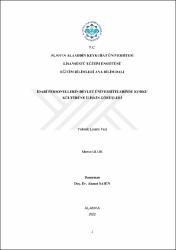İdari personellerin devlet üniversitelerinde korku kültürüne ilişkin görüşleri

View/
Access
info:eu-repo/semantics/openAccessDate
2022Author
Uluk, Merve
Şahin, Ahmet
ALKÜ, Enstitüler, Lisansüstü Eğitim Enstitüsü, Eğitim Bilimleri Ana Bilim Dalı
Metadata
Show full item recordAbstract
Bu çalışma, Türkiye'deki devlet üniversitelerinde çalışmakta olan idari personellerin korku kültürüne ilişkin görüşlerini belirlemek amacıyla yapılmıştır. Örneklem grubunun seçiminde uygun örnekleme yöntemi kullanılmıştır. Çalışmada tarama modellerinden biri olan betimsel tarama modeli kullanılmıştır. İdari personelin korku kültürü düzeylerini saptayabilmek için Çelik ve Kahraman (2019) tarafından geliştirilen "Okullarda Korku Kültürü" anket formu kullanılmıştır. Üniversiteler için ölçeğin geçerliği ve güvenirliği yeniden test edilmiştir. Elde edilen doğrulayıcı faktör analiz sonucuna göre modellenen faktör yapısının doğruladığı görülmüştür. Ölçme aracında Likert tipi beşli derecelendirme ölçeği kullanılmıştır. Çalışmanın evreni 2020-2021 yılında Türkiye'deki devlet üniversitelerinde çalışmakta olan 169.322 idari personelden oluşmaktadır. Örneklem grubuna ise çalışmaya gönüllü katılım sağlayan 308 kadın ve 620 erkek olmak üzere toplam 928 idari personel dâhil edilmiştir. İdari personeller; üst düzey yöneticiler (genel sekreter, genel sekreter yardımcısı, başkanı, fakülte/yüksekokul/enstitü sekreteri, idari amir, koordinatör), orta düzey yöneticiler (şube müdürleri, yurt amiri müdür yardımcısı, birim sorumlusu), alt düzey yöneticiler (şef, uzman, muhasebe yetkilisi) ve çalışanlar (bilgisayar işletmeni, veri hazırlama ve kontrol işletmeni, sürekli işçi, hizmetli, teknik personel, kütüphaneci) olarak 4 ayrı sınıfta toplanmıştır. Anlamlılık testlerinde 0,05 düzeyi esas alınmıştır. Elde edilen verilerin analizinde cinsiyet ve medeni durum değişkeni için ilişkisiz örneklemler için t-testi; mesleki kıdem, öğrenim durumu, unvan ve coğrafi bölge değişkenleri için tek yönlü varyans analizi (One Way ANOVA) ile analiz edilmiştir. Elde edilen veriler doğrultusunda; cinsiyet ve coğrafi bölgeler değişkeninde meslektaş korkusunda, mesleki kıdem değişkeninde yasal süreç korkusu ve meslektaş korkusunda, unvan değişkeninde yönetici ve meslektaş korkusunda anlamlı farklılık görülürken; medeni durum ve öğrenim durumu değişkenlerinde anlamlı farklılığa rastlanılmamıştır. Sonuç olarak yükseköğretim kurumlarında çalışan idari personellerin bazen yönetici korkusuna, nadiren meslektaş korkusuna ve yine nadiren yasal süreç korkusuna sahip oldukları belirlenmiştir. This study was conducted to determine the views of the administrative staff working at state universities in Turkey on the culture of fear. In the study, the descriptive survey research approach, one of the quantitative research methods, has been used. In order to determine the fear culture levels of the administrative staff, the "Fear Culture in Schools" questionnaire developed by Çelik and Kahraman (2019) was used. This scale has been re-tested for the validity and reliability. The factor structure was confirmed. A five-point likert scale was used in the measurement tool. The population of the study consists of 169,322 administrative staff working at state universities in Turkey in the academic year of 2020-2021. In the sample group, a total of 928 administrative personnel, 308 women and 620 men, who voluntarily participated in the study, were included. Administrative staff was classified in four sub-groups: Senior Managers (General Secretary, Deputy Secretary of Secretary, President, Faculty / School / Institute Secretary, Administrative Amir, Coordinator), Moderate Managers (Branch Managers, Deputy Director of Branch Manager, Deputy President, Unit Responsor), Sub-Level Managers (Chef, Expert, Accounting official) and Employees (computer operator, data preparation and control operator, workers, technical personnel, and librarian, etc.). The convenience sampling method was used in the selection of the sample group. The level of 0.05 was based on their significance tests. In the analysis, t-Test for Unrelated Samples were used for the gender and marital status variables. As for the analysis of the professional seniority, educational status, title and geographic region variables, One-Way Analysis of Variance (One Way ANOVA) was used. There were significant differences in the fear of colleagues for the variables of gender, and geographical regions. There were, also, significant differences in the fear of legal process, and fear of colleagues for the variable of professional seniority. As for the variable of title, there were significant differences in the fear of manager, and colleague. However, there were no significant difference for the variables of marital status and educational status. As a result, it has been determined that administrative personnel working in higher education institutions feel sometimes the fear of administrators, rarely the fear of colleagues, and rarely the fear of legal process.
Collections
- Tez Koleksiyonu [242]

















